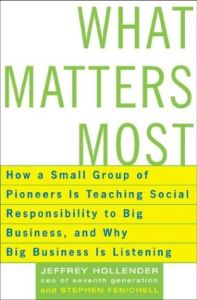
What Matters Most
How a Small Group of Pioneers Is Teaching Social Responsibility to Big Business, and Why Big Business Is Listening
Recommendation
This is an insider’s stroll through the confusing and ominous woods where the beasts of economic reality meet the lambs of social responsibility. Author and corporate survivor Jeffrey Hollender (who wrote this with scribe Stephen Fenichell) clearly admires the cast of socially responsible companies, such as Ben & Jerry’s and The Body Shop. He covers the informal history of the Corporate Social Responsibility (CSR) movement and his own troubling experiences as chief of a company that saw itself as socially responsible. His presentation is heartfelt, if short on rigorous logic. He candidly discusses having his ideals challenged and trying to justify his compromises. The book labels some behavior socially responsible and some socially irresponsible, but its yardstick is not clear. For example, it condemns the use of child factory labor in developing countries, yet never expresses awareness of the lack of practical alternatives for those children - perhaps starvation. The book explores both the value of the Corporate Social Responsibility movement and its uncomfortable contradictions. getAbstract.com recommends this trip inside the hard work of melding social responsibility with business.
Summary
About the Authors
Jeffrey Hollender is President and CEO of the Vermont-based company Seventh Generation, a natural and organic products firm, and author of How To Make the World a Better Place. Stephen Fenichell is the author of Plastic: The Making of a Synthetic Century and Other People’s Money: The Rise and Fall of OPM Leasing Services. He also contributed to A New Brand World: Eight Principles for Achieving Brand Leadership in the Twenty-First Century.







Comment on this summary